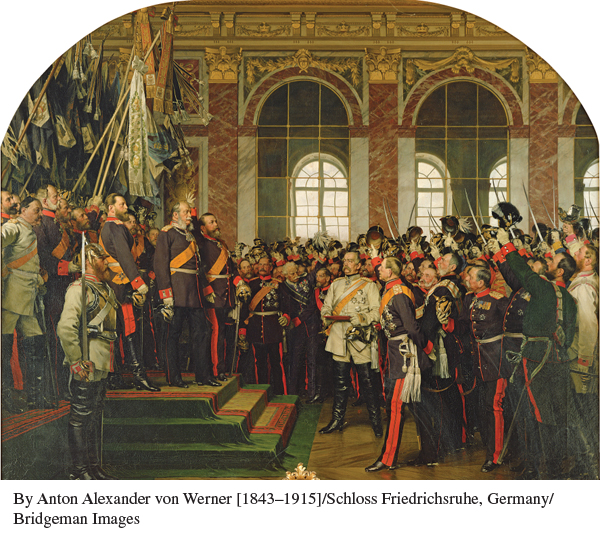A History of Western Society: Printed Page 763
A History of Western Society, Value Edition: Printed Page 731
A History of Western Society, Concise Edition: Printed Page 763
The Franco-Prussian War
The final act in the drama of German unification followed quickly. Bismarck calculated that a patriotic war with France would drive the south German states into his arms. Taking advantage of a diplomatic issue — whether a distant relative of Prussia’s Wilhelm I might become king of Spain — Bismarck pressed France. By 1870 the French leaders of the Second Empire, goaded by Bismarck and alarmed by their powerful new neighbor, declared war to teach Prussia a lesson.
As soon as war began, Bismarck enlisted support of the south German states. While other governments maintained their neutrality — Bismarck’s generosity to Austria in 1866 paid big dividends — combined German forces under Prussian leadership decisively defeated the main French army at Sedan on September 1, 1870. Louis Napoleon himself was captured and humiliated. Three days later, French patriots in Paris proclaimed yet another French republic and vowed to continue fighting. But after five months, in January 1871, a besieged and starving Paris surrendered, and France accepted Bismarck’s harsh peace terms.
By this time, the south German states had agreed to join a new German Empire. With Bismarck by his side, Wilhelm I was proclaimed emperor of Germany in the Hall of Mirrors in the palace of Versailles. As in the 1866 constitution, the king of Prussia and his ministers had ultimate power in the new German Empire, and the lower house of the legislature was elected by universal male suffrage.

Bismarck imposed a severe penalty on France: payment of a colossal indemnity of 5 billion francs and loss of the rich eastern province of Alsace and part of Lorraine to Germany. French men and women of all classes viewed these territorial losses as a terrible crime (see Map 23.2). They could never forget and never forgive, poisoning relations between France and Germany after 1871.
The Franco-